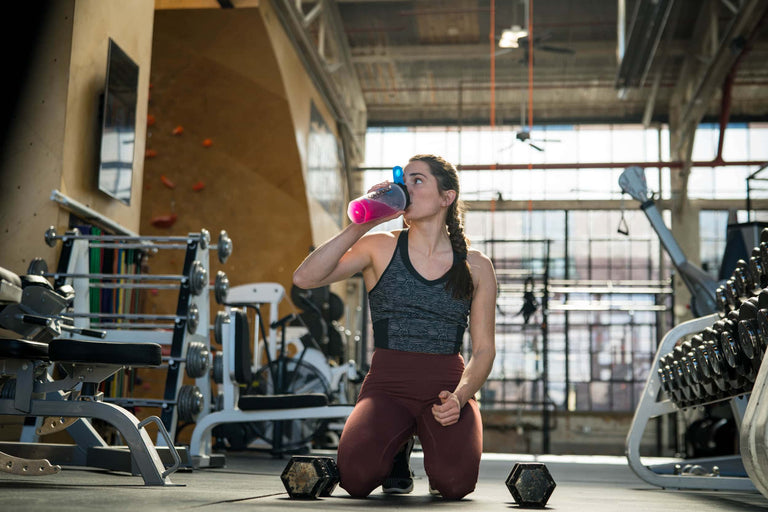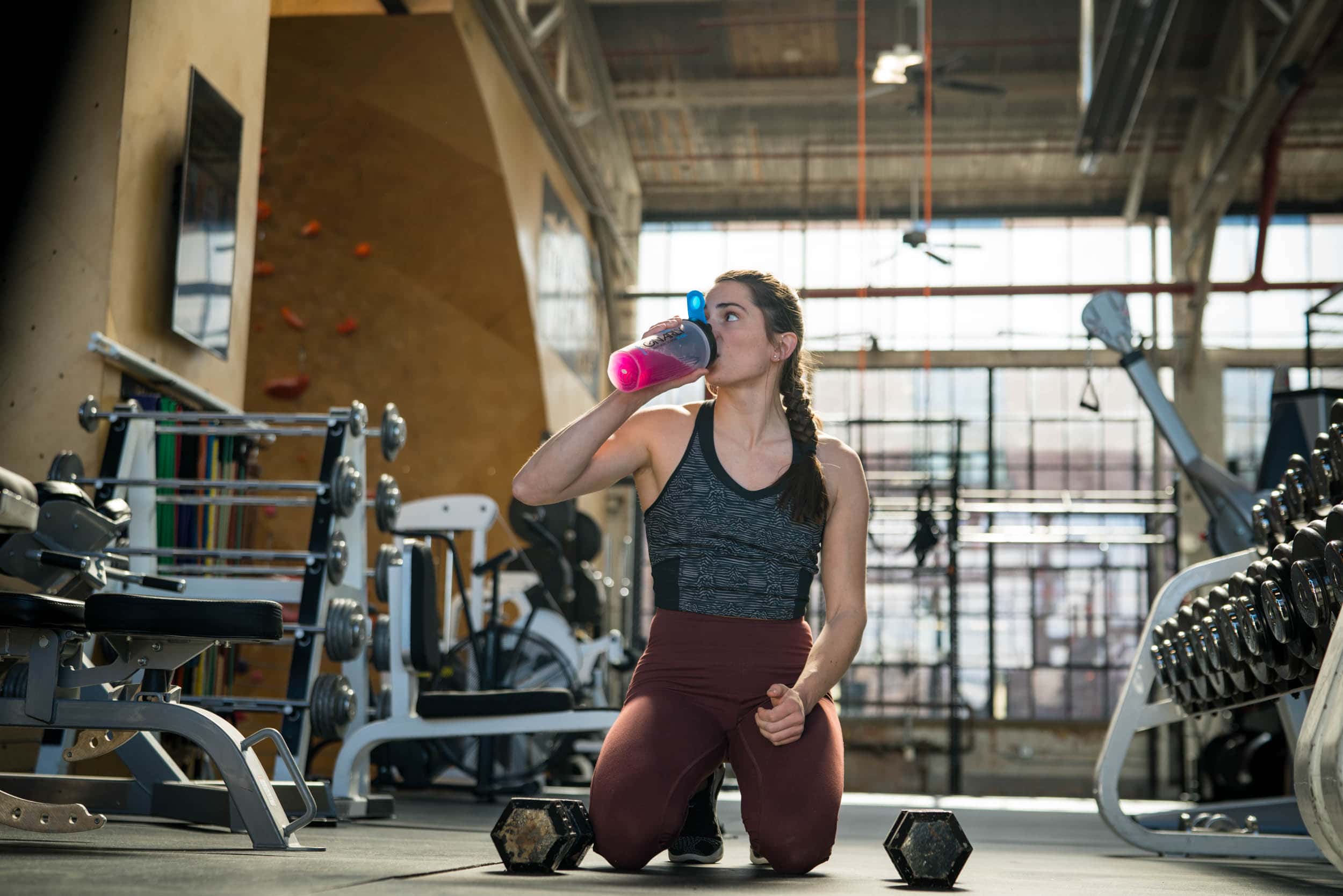We’ve come a long way in our technical understanding of nutrition. While protein has been popular since we learned to throw a hunk of meat over a fire, in the last few decades we’ve also learned a lot about how the individual amino acids that constitute protein affect our body. Now, if it fits our goals, we can get those amino acids outside of a complete protein.
For athletes, two popular types of amino acids are glutamine and the branched-chain amino acids (BCAAs), a trio of biochemically related amino acids. Both the BCAAs and glutamine have been hypothesized to improve exercise performance and recovery, and have been studied to that effect. In this article, we’ll look at what the science tells us about these amino acids and what it means supplementation-wise.
Glutamine—Non-Essential, or Potentially Conditionally Essential?
Officially, glutamine is a non-essential amino acid, which means our body can produce it in sufficient quantities (given a normal diet) to stay healthy. Glutamine is also an abundant amino acid in most protein-containing foods, meaning it’s likely that most of us are getting it from our diet without even needing to synthesize more ourselves. Why, then, is it a popular supplement?
Part of the reason is because glutamine, despite it’s abundance, is at times a “conditionally essential” amino acid—in other words, there are times when our own ability to produce it and the amount we get from our diet is inadequate to meet our needs. These conditions are primarily related to states of extra dietary need, including illness and injury, pregnancy and lactation, and growth. For some people in these circumstances, glutamine supplementation may be recommended.
For an individual athlete, these conditions may or may not be relevant, but glutamine is nevertheless often recommended prophylactically. We know, for example, that training hard can weaken the immune system and lead to illness; why not fight it before it starts?

Glutamine has also been suggested to affect exercise recovery. After training, plasma glutamine levels drop, and plasma glutamine has been used on occasion as a measure of overtraining. Supplementing with glutamine keeps glutamine levels normal, which hypothetically would prevent or at least waylay the egregious effects of overtraining. It may also improve post-exercise glycogen synthesis, which would also affect total recovery time.
If this all sounds great so far, but hold on a minute. While these are great hypotheses and paint a compelling picture of why glutamine should work, the problem is they have very little scientific support. There’s two reasons for this:
First, most studies examining the effects of individual amino acid supplements compare the supplement to an inert placebo like maltodextrin (a carbohydrate), or sometimes even to nothing at all. This might not seem like a problem—it might even seem like a good idea!—but all the results of such a study tell us is that glutamine is better than nothing when what we really want to know is if it’s better than protein (since we already consume protein numerous times a day). Protein contains glutamine as it is, and it’s quite possible (if not likely) that the glutamine from a protein shake or cup of beans does the exact same thing as an isolated glutamine supplement.
The second reason we see little scientific support for glutamine is that indicator amino acids (or other biomarkers, for that matter) are… well, they’re only indicators; they can signal that a problem exists, but turning off the signal (or fixing the signal so it seems normal) rarely solves the problem. Training hard depresses our immune system, and part of the way we can see that is by a depression in plasma glutamine—but artificially boosting glutamine levels doesn’t solve the problem.
Glutamine, therefore, is probably not worth supplementing with as the majority of research suggests it does very little for an otherwise healthy athlete. As mentioned, there may be times when it is conditionally essential, but these situations are uncommon and would be properly diagnosed by a doctor. For everyone else, you’re better off just eating a bit more protein!
The Branched - Chain amino acids
Like glutamine, the branched chain amino acids are commonly found in foods. Unlike glutamine, however, they are found primarily in high-quality proteins (meats, dairy, eggs, legumes) and are also 100% essential, meaning we need to get them from our diet.
BCAAs are popular sports supplements for a couple reasons. The first is that they could potentially improve intra-workout performance, and so they’re occasionally added as a sports drink ingredient.
They’re also used as boosters for muscle mass, and could potentially help reduce muscle damage during exercise. We’ll look at each of these potential reasons to supplement with BCAAs in turn.
The first use for BCAAs—as an intra-workout performance aid—revolves around a type of fatigue known as “central fatigue”. Unlike muscular fatigue (or peripheral fatigue), central fatigue traces back to our brain and is triggered in part by a decrease in plasma BCAAs. For most athletes, this isn’t a common problem as it only tends to occur past the three hour mark (and then only if you’re not consuming any calories during the workout). Ultra-endurance athletes may get more of a benefit here, though, as BCAAs are more easily (or at least more palatably) added to sports drink mixes than protein powders.
BCAAs are also used as a muscle growth aid. Of the three amino acids in a BCAA supplement, leucine is the most important as it functions as a trigger molecule for muscle protein synthesis. To maximally trigger muscle protein synthesis, our body needs somewhere between 1.5 and 2.5 grams of leucine. If we fall shy of this, we still trigger muscle protein synthesis, but it’s muted. A serving of a BCAA supplement will usually contain at least 2.5 grams of leucine, so there’s more than enough to get the maximum effect.
In this function, BCAAs can be strategically used. You wouldn’t want to replace all the protein in your diet with BCAAs, of course, because you still need all the other essential amino acids (and, really, the inessential ones as well for maximum benefit), but BCAAs can help. For example, some meals are inherently leucine-poor but otherwise are adequate in most other amino acids; adding BCAAs to such a meal would ensure you still get the most benefit from it. Vegetarians or vegans might not want to consume one of the limited foods that contain ample leucine (e.g., eggs, dairy, beans) at every meal, or to consume a protein shake, but could add BCAAs in much smaller amounts since you’re only looking to get the leucine trigger.
BCAAs can also help during fasted periods or periods when you wouldn’t normally want to consume protein. Ultra-endurance athletes have already been mentioned—they might not want to consume a protein shake every few hours while running or cycling—but it also applies to other athletes, if for different reasons than central fatigue. Sometimes you don’t want to consume a meal (or even a protein shake) before your workout; in such a circumstance, BCAAs can help reduce muscle protein breakdown. The same can be said for training in a fasted state: you may not want to consume a whole protein so as to avoid amino acid oxidation, but BCAAs mostly avoid this issue while still preventing muscle protein catabolism.
Relating to that final point, BCAAs can potentially reduce muscle damage (resulting from muscle protein breakdown during a workout) and thereby increase recovery time and reduce soreness. Recovery time can influence total training volume, especially for novice athletes who are more prone to DOMS, and thereby improve results.
Some Strategies Work, Some Don’t
Assuming you’re getting enough protein, the question of when to supplement should be seriously considered (if you’re not getting enough protein, that’s the first place to start). You can find nearly any amino acid you’d like in supplement form, but that doesn’t make them all worthwhile.
Most are like glutamine—inessential, readily available from our diet, and without documented benefit in athletes; taking these amino acids is kind of like adding extra salt to potato chips. For BCAAs, there are reasonable strategies, however.
If you’re vegan or vegetarian, or if you just eat meals free of animal proteins from time to time, then BCAAs can effectively close the leucine gap that may be present. Many vegetarian meals have overall adequate protein, they’re just a bit shy in leucine, and that holds them back. Fasting—whether for training or diet purposes—is also relatively common. Most people would prefer to avoid muscle loss during fasting (a well-known side effect), and BCAAs fight that outcome without breaking the fast.
In the end, you want to use your supplements strategically. So give your goals and needs some consideration—you might find a good supplemental solution.





